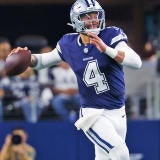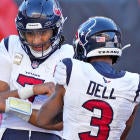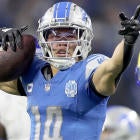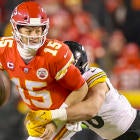With two weeks to prepare for the Super Bowl, there is plenty of time for coaches to notice all kinds of things about their opponent during film study. How wide are the splits of the offensive line? Do they have any tells for when they're bringing a blitz? What's their reaction like when the defense rolls a safety down toward the line of scrimmage? Which coverages do they like to play on third-and-long?
Within that film study, there's always one thing that jumps out at you first -- a defining characteristic of the opposing team. For Bill Belichick, the first thing he noticed -- or at least the first thing he's willing to tell media members on a conference call that he noticed -- about the Falcons is their speed.
"I'd say the stamp on the team, the thing that I would notice the most is just the speed, the team speed that the Falcons have," Belichick said, per Pro Football Talk. "They have a lot of fast guys. Defensively they close up space very quickly. Their linebackers run well. Their defensive line, although they have a couple of big, strong, physical guys in there, overall they have usually nine or 10 players on the field that I would say are fast. They're either as fast or faster than probably what the average speed of their position is in the league. I'd say that's a big stamp that he has put on the team."
If that's the first thing that jumps out at Belichick, it shouldn't be a surprise. The Falcons specifically set out to build a fast defense. Here's an excerpt from a story by Robert Mays at The Ringer on exactly that subject:
From his initial interview with Quinn, Dimitroff says he felt as if he'd found his football soulmate. "When Dan came on, I thought, 'This is a marriage made in heaven,'" he says from his office overlooking the Falcons practice field.
The pair shared a similar gridiron worldview -- that finding exceptional athletes who could cause and negate matchup problems should take precedence over everything else. To ensure that ideology would spread throughout their respective staffs, they decided to hold a daylong symposium -- the first of several they'd conduct -- during which Quinn and his coaches would present the schemes they planned to implement and the types of players that would best make it work. "In hindsight, as I looked at what we did here before, I didn't feel like we were as clear on what we needed, the nuances of each position, as we should've been," Dimitroff says. "And Dan completely agreed and we ran with it."
One by one, Quinn, his coordinators, and the team's position coaches stepped to the front of the room and delivered pitches on the sorts of players they coveted. As the day wore on, a common theme emerged. "It was Dan, it was the defensive coordinator, it was the secondary coach, it was the linebacker coach, it was the D-line coach -- everyone was emphasizing speed, speed, speed," Dimitroff says. "This was going to be one of the fastest teams that any of us would ever put together."
In the two years since, nearly all of Atlanta's personnel moves have fit that philosophy. That began in earnest in the 2015 draft, when the Falcons took Clemson pass rusher Vic Beasley -- and his 4.53-second 40-yard dash time -- with the eighth overall pick. The approach hasn't changed.
That focus did not necessarily manifest itself in elite overall performance this season, but the Falcons were situationally successful on defense. With one of the highest-scoring offenses in NFL history on their side, the Falcons defense was able to play from ahead a lot of the time, enabling their rushers to go full bore after the quarterback and use their speed to get around the edge. It also let their linebackers and safeties focus on covering space rather than having to out-physical opposing fronts.
The central theme of the Patriots' team on both sides of the ball is adaptability, so it will be interesting to see how they deal with a team that is apparently so much faster than the others for which Belichick has prepared.






















